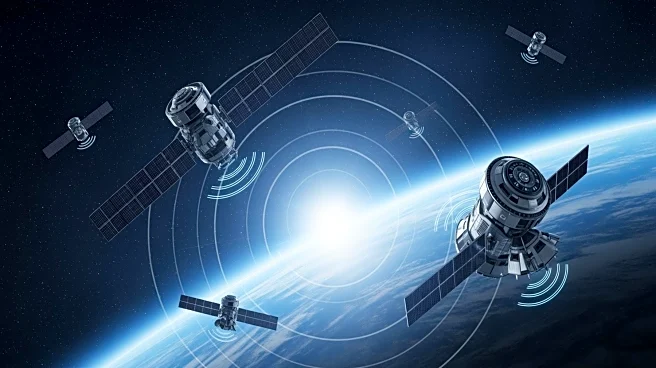What's Happening?
A constellation of classified defense satellites operated by SpaceX, known as Starshield, is emitting a mysterious signal that may violate international standards. These satellites are transmitting on frequencies
typically reserved for sending commands from Earth to satellites, rather than downlinking data. This unusual use of frequencies could interfere with other scientific and commercial satellites, according to Scott Tilley, an amateur satellite tracker who first detected the signals. The discovery was made accidentally when Tilley was scanning radio frequencies from his home in British Columbia. The signals were found in a frequency band reserved for uplinking data, which should not have any signals coming from space. SpaceX and the U.S. National Reconnaissance Office, which operates the satellites, have not commented on the issue.
Why It's Important?
The emission of signals by SpaceX's Starshield satellites raises concerns about potential interference with other satellite operations. This could impact scientific research and commercial satellite communications, as nearby satellites might receive radio-frequency interference, potentially ignoring or misinterpreting commands from Earth. The situation highlights the challenges of managing radio spectrum usage globally, especially with the increasing number of satellites in orbit. The issue also underscores the need for transparency and coordination among satellite operators to prevent disruptions in space activities. The broader implications could affect international relations and agreements on space usage, as well as the operations of companies relying on satellite communications.
What's Next?
The discovery of the Starshield signals has prompted calls for greater awareness among satellite operators about the potential interference. It remains to be seen how SpaceX and the U.S. National Reconnaissance Office will respond to these concerns. There may be discussions or negotiations at international levels to address the use of radio frequencies and ensure compliance with established standards. Satellite operators and regulatory bodies might seek to investigate further and implement measures to mitigate any potential disruptions caused by the Starshield network. The situation could lead to increased scrutiny of classified satellite operations and their impact on global communications.
Beyond the Headlines
The Starshield signal issue highlights the ethical and legal dimensions of satellite operations, particularly those involving classified networks. The use of frequencies reserved for uplinking data to downlink information raises questions about the transparency and accountability of such operations. It also points to the need for international cooperation in managing space resources and ensuring that technological advancements do not compromise existing systems. The incident could trigger discussions on the balance between national security interests and global communication needs, as well as the role of private companies in defense-related satellite operations.









